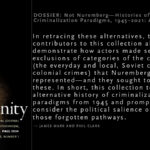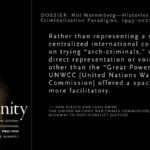The Western myth of Nuremberg has dominated understandings of the evolution of international criminal law. Enshrining the International Military Tribunal as a critical point of origin, this paradigm has developed a narrative of post-war liberal progress, in which a universal model of externally-delivered, individualised criminal justice was interrupted by the exigencies of the Cold War then rediscovered through various international and hybrid tribunals in the 1990s and early 2000s, culminating in the creation of the International Criminal Court in 2002. Often instrumentalised to protect Western Continue reading → Continue reading →
This article offers a critique of the Nuremberg-inspired paradigm of international criminal justice, which focuses on high-profile, top-down approaches to post-conflict accountability. To this end, it appraises the work of the United Nations War Crimes Commission as a “path not taken.” We discuss the very different approach to supporting post-conflict justice adopted by the UNWCC—from its original support base beyond the major geopolitical powers, to the impact of its more deliberative system, to the role of the UNWCC as a hub in which new practices Continue reading → Continue reading →


